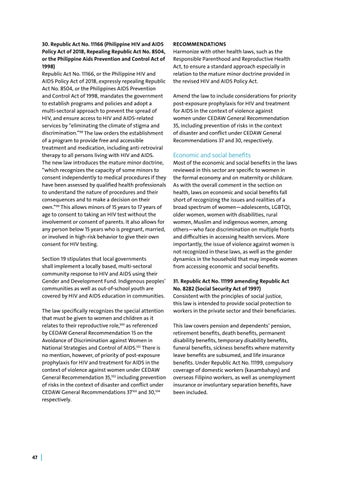30. Republic Act No. 11166 (Philippine HIV and AIDS Policy Act of 2018, Repealing Republic Act No. 8504, or the Philippine Aids Prevention and Control Act of 1998) Republic Act No. 11166, or the Philippine HIV and AIDS Policy Act of 2018, expressly repealing Republic Act No. 8504, or the Philippines AIDS Prevention and Control Act of 1998, mandates the government to establish programs and policies and adopt a multi-sectoral approach to prevent the spread of HIV, and ensure access to HIV and AIDS-related services by “eliminating the climate of stigma and discrimination.”98 The law orders the establishment of a program to provide free and accessible treatment and medication, including anti-retroviral therapy to all persons living with HIV and AIDS. The new law introduces the mature minor doctrine, “which recognizes the capacity of some minors to consent independently to medical procedures if they have been assessed by qualified health professionals to understand the nature of procedures and their consequences and to make a decision on their own.”99 This allows minors of 15 years to 17 years of age to consent to taking an HIV test without the involvement or consent of parents. It also allows for any person below 15 years who is pregnant, married, or involved in high-risk behavior to give their own consent for HIV testing. Section 19 stipulates that local governments shall implement a locally based, multi-sectoral community response to HIV and AIDS using their Gender and Development Fund. Indigenous peoples’ communities as well as out-of-school youth are covered by HIV and AIDS education in communities. The law specifically recognizes the special attention that must be given to women and children as it relates to their reproductive role,100 as referenced by CEDAW General Recommendation 15 on the Avoidance of Discrimination against Women in National Strategies and Control of AIDS.101 There is no mention, however, of priority of post-exposure prophylaxis for HIV and treatment for AIDS in the context of violence against women under CEDAW General Recommendation 35,102 including prevention of risks in the context of disaster and conflict under CEDAW General Recommendations 37 103 and 30,104 respectively.
47
|
RECOMMENDATIONS Harmonize with other health laws, such as the Responsible Parenthood and Reproductive Health Act, to ensure a standard approach especially in relation to the mature minor doctrine provided in the revised HIV and AIDS Policy Act. Amend the law to include considerations for priority post-exposure prophylaxis for HIV and treatment for AIDS in the context of violence against women under CEDAW General Recommendation 35, including prevention of risks in the context of disaster and conflict under CEDAW General Recommendations 37 and 30, respectively.
Economic and social benefits Most of the economic and social benefits in the laws reviewed in this sector are specific to women in the formal economy and on maternity or childcare. As with the overall comment in the section on health, laws on economic and social benefits fall short of recognizing the issues and realities of a broad spectrum of women—adolescents, LGBTQI, older women, women with disabilities, rural women, Muslim and indigenous women, among others—who face discrimination on multiple fronts and difficulties in accessing health services. More importantly, the issue of violence against women is not recognized in these laws, as well as the gender dynamics in the household that may impede women from accessing economic and social benefits. 31. Republic Act No. 11199 amending Republic Act No. 8282 (Social Security Act of 1997) Consistent with the principles of social justice, this law is intended to provide social protection to workers in the private sector and their beneficiaries. This law covers pension and dependents’ pension, retirement benefits, death benefits, permanent disability benefits, temporary disability benefits, funeral benefits, sickness benefits where maternity leave benefits are subsumed, and life insurance benefits. Under Republic Act No. 11199, compulsory coverage of domestic workers (kasambahays) and overseas Filipino workers, as well as unemployment insurance or involuntary separation benefits, have been included.

